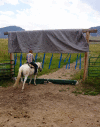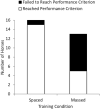Spaced training enhances equine learning performance
- PMID: 34860336
- PMCID: PMC9107396
- DOI: 10.1007/s10071-021-01580-7
Spaced training enhances equine learning performance
Abstract
This field experiment examined whether the well-documented benefit of spaced over massed training for humans and other animals generalizes to horses. Twenty-nine randomly selected horses (Equus ferus caballus) repeatedly encountered a novel obstacle-crossing task while under saddle. Horses were randomly assigned to the spaced-training condition (2 min work, 2 min rest, 2 min work, 2 min rest) or the massed-training condition (4 min work, 4 min rest). Total training time per session and total rest per session were held constant. Days between sessions (M = 3) were held as consistent as possible given the constraints of conducting research on a working ranch and safety-threatening weather conditions. During each training session, the same hypothesis-naïve rider shaped horses to cross a novel obstacle. Fifteen of 16 horses in the spaced-training condition reached performance criterion (94% success) while only 5 of 13 horses in the massed-training condition reached performance criterion (39% success). Horses in the spaced-training condition also initiated their first obstacle-crossing faster than horses in the massed-training condition and were faster at completing eight crossings than horses in the massed-training condition. Overall, task acquisition was higher for horses undergoing spaced training despite both groups experiencing the same total work and rest time per session. These findings generalize the learning-performance benefit observed in human spaced practice to horses and offer applied benefit to equine training.
Keywords: Equine cognition; Horse behavior; Spaced and massed learning; Training schedule.
© 2021. The Author(s).
Conflict of interest statement
None to report.
Figures



References
-
- Amsel A, Wong PT, Traupmann KL. Short-term and long-term factors in extinction and durable persistence. J Exp Psychol. 1971;90:90–95. doi: 10.1037/h0031407. - DOI
-
- Banaji MR, Crowder RG. The bankruptcy of everyday memory. Am Psychol. 1989;44:1185–1193. doi: 10.1037/0003-066X.44.9.1185. - DOI
-
- Beattie EK, Corr PJ. Reinforcement, arousal and temporal factors in procedural learning: a test of Eysenck’s and Gray’s personality theories. J Individ Differ. 2010;31:167–177. doi: 10.1027/1614-0001/a000008. - DOI
Publication types
MeSH terms
Grants and funding
LinkOut - more resources
Full Text Sources

